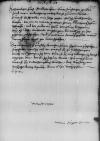Eurer F(urstlich) G(naden) schreiben mir yetzo gethan, / hab ich sambt zwayen briefen, / der ain an meinen gnedigen herren marggraf Johann Albrecht of Brandenburg-Ansbach (Johann Albrecht von Hohenzollern) (*1499 – †1550), son of Friedrich V, Margrave of Brandenburg and Sophia, daughter of Casimir IV Jagiellon, King of Poland; brother of Albrecht I von Hohenzollern Duke in Prussia; 1545-1550 archbishop of Magdeburg and bishop of Halberstadt ⌊Johan(n) AlbrechtenJohann Albrecht of Brandenburg-Ansbach (Johann Albrecht von Hohenzollern) (*1499 – †1550), son of Friedrich V, Margrave of Brandenburg and Sophia, daughter of Casimir IV Jagiellon, King of Poland; brother of Albrecht I von Hohenzollern Duke in Prussia; 1545-1550 archbishop of Magdeburg and bishop of Halberstadt ⌋, / und der ander an herr(e)n Cornelis De Schepper (Cornelius Scepperus, Cornelis De Dobbele, Cornelius Duplicius) (*1503 – †1555), erudite, diplomat in the Habsburgs' service; close friend of Ioannes Dantiscus; initially in the service of Christian II of Oldenburg, King of Denmark; 1526 secretary and councillor to Emperor Charles V of Habsburg (CE, vol. 3, p. 218-220; DE VOCHT 1961, p. 15-24)⌊Cornelium ScepperumCornelis De Schepper (Cornelius Scepperus, Cornelis De Dobbele, Cornelius Duplicius) (*1503 – †1555), erudite, diplomat in the Habsburgs' service; close friend of Ioannes Dantiscus; initially in the service of Christian II of Oldenburg, King of Denmark; 1526 secretary and councillor to Emperor Charles V of Habsburg (CE, vol. 3, p. 218-220; DE VOCHT 1961, p. 15-24)⌋, / Charles V of Habsburg (*1500 – †1558), ruler of the Burgundian territories (1506-1555), King of Spain as Charles I (1516-1556), King of Naples and Sicily, King of the Romans (1519-1530), Holy Roman Emperor of the German Nation (elected 1519, crowned 1530, abdicated 1556); son of Philip I the Handsome and Joanna the Mad of Castile⌊kay(serlicher) m(ajestät)Charles V of Habsburg (*1500 – †1558), ruler of the Burgundian territories (1506-1555), King of Spain as Charles I (1516-1556), King of Naples and Sicily, King of the Romans (1519-1530), Holy Roman Emperor of the German Nation (elected 1519, crowned 1530, abdicated 1556); son of Philip I the Handsome and Joanna the Mad of Castile⌋ rat lauttende, / empfangen, / die will ich an ire gehorige ort schickhen / und, so antwurt darauf gefellt, / meine(n) diener Georg Hegel (†1547), the Thurzons' and later the Fuggers' factor in Cracow (worked for the Fuggers at least from 1521); supplier to the royal court in Cracow (PSB 9, p. 336)⌊Jorgen HegelGeorg Hegel (†1547), the Thurzons' and later the Fuggers' factor in Cracow (worked for the Fuggers at least from 1521); supplier to the royal court in Cracow (PSB 9, p. 336)⌋ gen Cracow (Kraków, Cracovia), city in southern Poland, Małopolska, on the Vistula river, from 1038 capital of the Kingdom of Poland⌊CracaCracow (Kraków, Cracovia), city in southern Poland, Małopolska, on the Vistula river, from 1038 capital of the Kingdom of Poland⌋ schickhen./
Das wiltnus ol so Eur F(urstlich) G(naden) bemelten Georg Hegel (†1547), the Thurzons' and later the Fuggers' factor in Cracow (worked for the Fuggers at least from 1521); supplier to the royal court in Cracow (PSB 9, p. 336)⌊Jorgen HegelGeorg Hegel (†1547), the Thurzons' and later the Fuggers' factor in Cracow (worked for the Fuggers at least from 1521); supplier to the royal court in Cracow (PSB 9, p. 336)⌋ / mir zu schickhen / zuegestellt, / nemb ich also von Euren F(urstlich) G(naden) zu underthenigem danckh an. / Warinn ich dann Euren F(urstlich) G(naden) auch underthenig dienst ertzaigen kan, / das bin ich zethuen beraitt. /
Thue mich hiemit Euren F(urstlich) G(naden) underthenigklich bevelchen./


 BCz, 1597, p. 1018
BCz, 1597, p. 1018